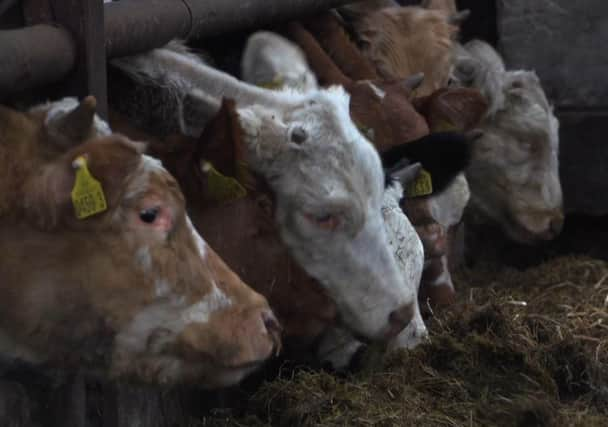Irish Sea border: French cows can enter Northern Ireland from GB - but British animals can't


The UK’s Department of Environment, Food & Rural Affairs (Defra) confirmed that EU livestock can enter Northern Ireland via Great Britain as they are treated as ‘re-entering’ the EU.
But the department has also confirmed that British farm animals cannot enter Northern Ireland while decisions are made on whether or not EU rules are met.
Advertisement
Hide AdAdvertisement
Hide AdThat’s because movements from Great Britain to Northern Ireland now adhere to the same rules as those governing movements from GB to the European Union.
An export health certificate is required to move animals from Great Britain to Northern Ireland or the EU.
The story emerged after a farmer contacted the News Letter to express concern about cattle, transported from France, staying overnight in Scotland – whilst they couldn’t bring animals they had purchased across the Irish Sea because the animals were from Great Britain.
Additional restrictions have been put in place by the EU after Great Britain lost its blue tongue (Btv) free status.
l Turn to page 5
Advertisement
Hide AdAdvertisement
Hide AdJim Allister said it is “beyond reason” that cattle can move from France through GB to NI, but not from GB if they originate there. He said: “The root of this problem lies in the fact that because of the Protocol and resulting Sea Border we continue to be regarded as EU territory. It is scandalous that farmers cannot bring cattle from another part of their own country into Northern Ireland but there is no such prohibition on cattle coming from the EU where the blue tongue problem is more pronounced.”
The TUV leader has written to the Secretary of State on the issue on behalf of constituents whose farming businesses “are blighted” with the restrictions. The North Antrim MLA said: “Even though the restricted zone in southern England has been lifted, my constituent’s livestock continue to be blocked from moving to my part of the United Kingdom, with huge resulting costs to keep the stock in GB”.
Tom Elliott – the UUP chair of Stormont’s agriculture committee – said there have always been rules for cattle coming from GB – but the Windsor Framework has made it “significantly worse” and the ban “clearly demonstrates that NI remains within the EU trade and animal health zone”.
The Fermanagh MLA said it is “an unreasonable position” that French livestock can come here through “a relatively easy process”, but British animals can’t. He added: “NI Pedigree livestock breeders are finding it most challenging as they have been bringing livestock to sales in Scotland and England on a regular basis, but if they do not sell the animals it proves great difficulty and expense getting them home. The same applies if they buy livestock in GB, it is a huge expense to have them retained at an export centre for a number of weeks”.
Advertisement
Hide AdAdvertisement
Hide AdBtv is endemic in parts of the EU. The whole territory of mainland France is a restricted zone for two strains of the virus, meaning susceptible livestock cannot be moved to Great Britain without prior vaccination. In November, one cow on a farm in Kent tested positive for Btv and there have been four further cases all located within a 10km Temporary Control Zone. There is no evidence that the virus is circulating in midges in Great Britain – which is how it spreads. In contrast, strains of the virus have affected thousands of farms in France in recent years and the disease is endemic in Italy.
The News Letter has seen correspondence from UK biosecurity officials which claims that there may be negotiations ongoing with the EU over the issue.
A DEFRA spokesperson said: “To protect the biosecurity status of Northern Ireland, the movement of susceptible livestock from Great Britain has been temporarily stopped whilst epidemiological investigations necessary for EU listing take place.
“Movements of cattle from Bluetongue free areas can exit the EU, via a third country, and re-enter with the correct Intra-Community Trade Animal Health Certificate. These moves are only permitted if specific measures are complied with such as the vehicle is cleansed, disinfected, and treated with insecticide during a rest period of no more than 24 hours in GB.’’
Comment Guidelines
National World encourages reader discussion on our stories. User feedback, insights and back-and-forth exchanges add a rich layer of context to reporting. Please review our Community Guidelines before commenting.